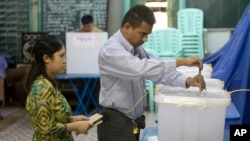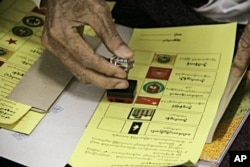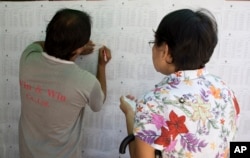While a key U.S. official hints that Sunday's election in Myanmar could lead to more engagement, critics claim the military is still too powerful.
U.S. State Department Spokesman John Kirby on Thursday said key officials would be closely watching the election for signs of progress from military dictatorship to democracy.
U.S. Ambassador Derek Mitchell, U.S. embassy staff, USAID Assistant Administrator Jonathan Stivers and congressional staffers planned to be monitoring throughout the election, Kirby said at a briefing in Washington.
“The United States has provided elections monitoring training and support to civil society organizations there, which will field 5,000 independent, non-partisan electoral advisers, and we continue to urge the government of Burma [Myanmar] to allow observers to access advance voting in the military compounds,” said Kirby.
One problem that is potentially facing the conduct of the election is the failure of the Myanmar election commission to finalize voter lists just days before the balloting.
What to Know About Myanmar
Myanmar
Myanmar, the Southeast Asian nation formerly known as Burma, will go to the polls Sunday in the first parliamentary elections -- touted by the government as a free and fair -- since the end of five decades of military dictatorship.
Head of government: President Thein Sein, since Feb. 4, 2011
Political parties: Several, although the two main parties are the ruling and military-backed Union Solidarity and Development Party, and the main opposition party, National League for Democracy.
Location: Southeastern Asia, bordering the Andaman Sea and the Bay of Bengal, between Bangladesh and Thailand
Capital: Yangon; Nay Pyi Taw is the administrative capital
Population: 56,320,206; 30 million of voting age; world ranking, 25th largest
Ethnic groups: Burman, 68 percent; Shan, 9 percent; Karen, 7 percent; Rakhine, 4 percent; Chinese, 3 percent; Indian, 2 percent; Mon, 2 percent; other, 5 percent
Religions: Buddhist, 89 percent; Christian, 4 percent (Baptist, 3 percent, Roman Catholic, 1 percent); Muslim, 4 percent; Animist, 1 percent; other, 2 percent
Median age: 28.3 years overall; men, 27.7 years, women, 28.9 years (2015 estimate)
Literacy (those age 15 and older who can read and write): total population, 93.1 percent; men, 95.2 percent; women, 91.2 percent (2015 estimate)
Internet users: total, 646,700; percent of population, 1.2 percent (2014 estimate); world ranking, 128
Telephones: fixed lines, 530,000; cellphones, 26.6 million (2014 estimate)
Labor force: 35.23 million (2014 estimates); world ranking, 18
Source: CIA World Factbook
"We are focused on ensuring that the conduct and outcome of the elections are as credible, transparent and as inclusive as possible ... we will continue to emphasize the importance that key Burmese [Myanmar] political institutions respect the outcome of that process," said Kirby.
The U.S. has spent millions of dollars in the past few years to strengthen Myanmar's democratic institutions, including voter education, training of poll workers and observers and working with institutions to help political parties develop their platforms.
Important milestone
Myanmar’s elections are seen as an important milestone in its political transition away from decades of military dictatorship. It is the country’s first general election since a nominally civilian government was introduced in 2011.
In 2012, while easing restrictions to allow U.S. companies to responsibly do business in Myanmar, also known as Burma, President Obama also signed an executive order to broaden the scope of existing sanctions for those who engage in human rights abuses or contribute to ethnic conflicts.
Earlier this week, White House Deputy National Security Adviser for Strategic Communications Ben Rhodes, who recently traveled to Myanmar, told an audience in Washington that “there’re a lot of potential benefits down the road."
That could be viewed as the possibility of more U.S. and western engagement, including the lifting or easing of more sanctions against Myanmar.
David Steinberg of Georgetown University believes the election will push Myanmar toward pluralism as a first step towards real democracy. In a recent interview with VOA, Steinberg said the vote will have multiple benefits.
“One, for establishing a free election tradition in the country for the future; two, it will be very important for international perception in the west, especially of the future of the country."
Wait and see
But Phil Robertson, Human Rights Watch Asia Division Deputy Director, told VOA in an email that “the US government should not even be contemplating the relaxing of sanctions because when one scratches the surface of Burmese politics or the economy, what's underneath is the Burma Army.”
Although the Myanmar government has undertaken a number of reforms since 2011, critics say significant challenges still remain. They say some structural impediments to an inclusive and fair democracy include constitutional restrictions on political participation and discrimination against ethnic minorities and religious groups.
Opposition leader and Nobel laureate Aung San Suu Kyi is leading a vigorous election challenge to the ruling party, but she is barred by the current constitution from becoming president.
Another example, critics point to, is the mass disfranchisement of tens of thousands of ethnic and religious minorities, including the largely Muslim Rohingya people.
Robertson said the United States could do a number of things to penalize the continuing discrimination against Muslim minorities, but it is likely the government would continue its policy of “engagement and suasion.”






